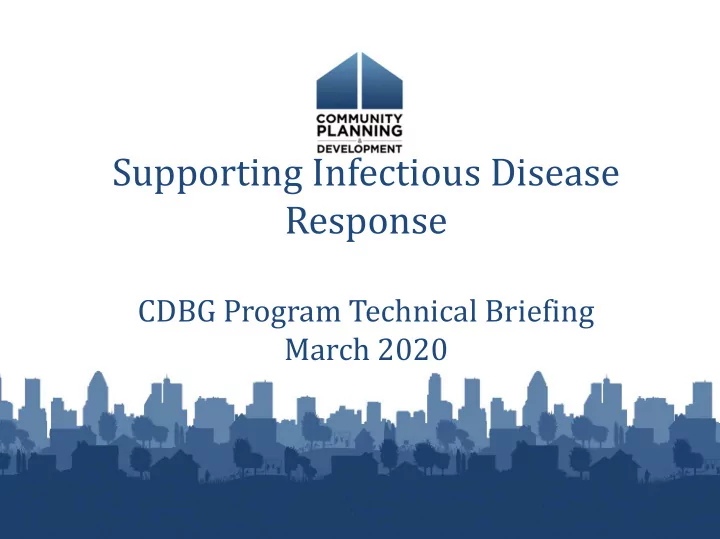

Supporting Infectious Disease Response CDBG Program Technical Briefing March 2020
Introduction and Opening Remarks • Janet Golrick– Acting Deputy Assistant Secretary for Grant Programs • John Gibbs, Acting Assistant Secretary for Community Planning and Development
CDBG Topics • Presenter: Jessie Handforth Kome, Director, Office of Block Grant Assistance • Eligible Activities for Infectious Disease Response • 2-pager on HUD Exchange with examples • https://files.hudexchange.info/resources/docu ments/Quick-Guide-CDBG-Infectious-Disease- Response.pdf
CDBG Topics • Buildings and Improvements, Including Public Facilities • Assistance to Businesses, Including Special Economic Development • Public Services • Planning, Capacity Building, and TA
CDBG Topics • CDBG grantees must amend their Consolidated Annual Action Plan when there is a change to the allocation priorities or method of distribution of funds; an addition of an activity not described in the plan; or a change to the purpose, scope, location, or beneficiaries of an activity (24 CFR 91.505). • If changes meet the criteria for a “substantial amendment” in the grantee’s citizen participation plan, the grantee must follow its citizen participation process for amendments (24 CFR 91.105 and 91.115).
CDBG Topics for Grantees Virtual Hearings Q: Is there any guidance from HUD as to changes to public participation/hearing policies? May grantees suspend the onsite public participation hearings for the annual action plan? We have had several grantees contact us who have expressed concern about attending our mandatory public hearing this week, as they work with medically vulnerable populations. A: If a grantee is concerned about significant public health risks that may result from holding in- person public hearings, the grantee may undertake a virtual public hearing (alone, or in concert with an in-person hearing) if it allows questions in real time, with answers coming directly from the elected representatives to all “attendees”. As with an in-person hearing, the grantee must select a virtual hearing method or platform that provides for accessibility for persons with disabilities and LEP to participate. The grantee must document its efforts and the reason for them, and update its citizen participation plan as soon as possible. HUD understands the exigencies of a public health challenge and will not penalize a grantee who does its best to comply with citizen participation requirements and documents its efforts.
CDBG Topics for Grantees Timeliness considerations • Q: How will HUD view a CDBG grantee that becomes untimely because it had to suspend or delay program operations to respond to the effects of the coronavirus (COVID-19)? • A: If a CDBG grantee does not carry out its activities in a timely manner, HUD consults with the grantee to determine the causes. If the causes are beyond the grantee’s control, as the virus is, HUD does not take corrective action, but works with the grantee to ensure that the grantee is timely at the next annual checkpoint.
CDBG Topics for Grantees • Public services limitation statutory – 15% for almost all grantees • Public services and capacity building do not include general conduct of government or general operating for subrecipients
HUD Considerations • Processing ConPlans automated • Expedite FY 2020 grant agreements • NSP funds – Transfer to CDBG for response
HUD Considerations • Reaching teleworking staff – Phones are forwarded, email • Regulatory waivers • Statutory suspensions for major disaster declarations • Supplemental appropriation – Self-implementing provisions – Launch
Questions and Thank you! CPDQuestionsAnswered@hud.gov
Recommend
More recommend